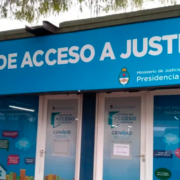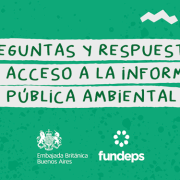Public procurement in a pandemic: a year of direct contracting and lack of transparency
Today the Red Ruido made its presentation with its first investigation on “Public procurement in a pandemic: 2020, the year of direct contracting and the lack of transparency.”
“Below, we offer a google translate version of the original article in Spanish. This translation may not be accurate but serves as a general presentation of the article. For more accurate information, please switch to the Spanish version of the website. In addition, feel free to directly contact in English the person mentioned at the bottom of this article with regards to this topic”.
Ruido is a national network made up of journalists, communicators, specialists in open data and referents of civil organizations from 15 provinces that aims to make visible content from all over the country related to issues of transparency, access to public information, corruption and produce investigations, reports and other content related to these topics. From Fundeps we support the creation of the Red Ruido in alliance with FOPEA and with the collaboration of Poder Ciudadano.
These are the results of the first Noise investigation How were public funds used in Argentina for purchases related to the pandemic in 2020?
Through surveys on public portals and requests for access to information, it investigated information on public purchases in pandemic in 13 Argentine provinces and the Autonomous City of Buenos Aires between March and December 2020 to answer the following questions: what bought? how they did it? How much did they pay?
Highlights
- 92% of purchases in the framework of the health emergency were made directly, according to the Noise survey in 14 Argentine provinces.
- The province of Buenos Aires bought ambulances at prices much higher than those of the rest of the districts.
- Chaco paid for the most expensive N95 chinstrap in the country.
- Córdoba and Buenos Aires concentrated the highest billing in a single supplier.
- Santa Cruz purchased the liter of ethyl alcohol at the highest cost.
- The most opaque provinces: Formosa, Santiago del Estero and Tucumán do not make any purchase details public.
- Difficulties in accessing information in each district.
- Reports and data province by province
Buenos Aires, with the most expensive ambulances in the country
The information obtained is partial and incomplete despite requests for access to the information, which were not answered. The most striking case: the ambulances of more than $ 13 million.
Catamarca, little information and a lot of jet
There are no public portals to access purchases and the information collected on expenses due to Covid-19 is minimal. A health jet purchased in a pandemic cost $ 8,950,000.
Chaco, no frame
There is a shopping portal, but it is impossible to know which ones correspond to the emergency due to the pandemic. The request for access to information was not answered.
CABA, with 210 operations without consignment
It is one of the best organized districts, with the display of public purchases. Although there are 210 operations that cannot be traced. Suppliers to investigate.
Córdoba, with differences
Almost all the data are available online. The Noise survey shows 83% of direct awards. The Government has another interpretation.
Entre Ríos: the dispute to investigate overpricing
The limit for direct purchases in a pandemic was extended to almost $ 5 million. And the ordinary and federal Justices dispute an investigation for overpricing.
Formosa, the impenetrable
There are no web portals or information on hiring in a pandemic. The only response to the request for access was the figure of how much was the total spent.
Mendoza, accessible
The province is one of the most transparent in relation to the publication of contracts. More information here.
Salta, the imprecise
It is not possible to access the information of the final awards. The government did not respond to requests for access to information on Ruido.
Incomplete answer in Santa Cruz
It does not publish official purchase data. Noise got them after access requests, which were answered by five out of seven ministries. The “sensitive data” that is not displayed. More information here.
Santa Fe, with confusing data
There is no coincidence between the few operations that appear on the official shopping portal, reported by Ruido. It is also not clear if they correspond to the emergency due to the pandemic. More information here.
Santiago del Estero: not even paying
It is one of the most opaque provinces: it was not possible to access any public information, despite requests for access. More information here.
Tierra del Fuego: Covid drivers
Partial data was accessed. The hiring of chauffeurs for a secretariat is striking, due to pandemic reasons. More information here.
Tucumán: 5 years to access the information
No information was obtained regarding any public purchases of pandemic expenditures. There is a case about access to information that the Tucumán Justice has not resolved for five years. More information here.
More information
Authors of the Noise survey
Mariela Arias (Santa Cruz), Marcela Arce (Santiago del Estero), María Ester Romero (Buenos Aires and CABA), Yamile González (Formosa), Gabriela Sánchez (Mendoza), Bárbara Maidana (Chaco and Sante Fe), Cristian Pérez and Juan Manuel González (Córdoba), Gabriel Ramonet (Tierra del Fuego), Luciano Garro (Entre Ríos), Gonzalo Guzmán (Salta Transparente), Luis María Ruiz (Tucumán), Sol Minoldo, Julieta Fantini, Andrés Vázquez, Sergio Carreras and Edgardo Litvinoff.
Learn more about El Ruido






